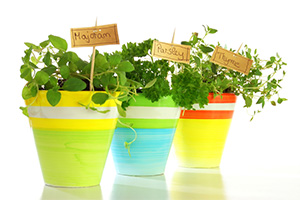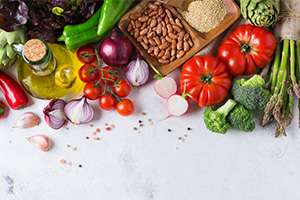
When the global Covid-19 pandemic was announced last March, there was no knowing how long it might last. By now, many of us realise that navigating a global pandemic is more of a marathon than a sprint.
In light of these wild and woolly times, it’s not surprising if you’re finding things challenging right now. In fact, it’s a perfectly natural response. And you certainly aren’t alone.
Nevertheless, we must try, at least, to remain optimistic and excited about the future, even if it feels like a Herculean task. In the meantime, there are many aspects of your life that you can control to make each day spent in lockdown a little easier. Focusing on your diet is a great place to start.

Eat for immunity: It can be very tempting to throw caution to the wind and comfort-eat your way through lockdown. And while that’s okay from time to time, trying to eat with your immune system in mind will only serve your health in the present climate. Following a mainly wholefood diet, feeding your gut and drinking enough water are some of the best interventions to support your immunity during lockdown and beyond.
Go for wholefoods: Wholefoods are minimally processed, as close to their natural form as possible, and immediately identifiable (vegetables that look like vegetables, for example). Eating a mainly wholefood diet will help to educate and balance your immune system. Highly processed foods, on the other hand, often contain refined carbs, unhealthy fats, free sugars and salt. These foods are also a woefully poor source of dietary fibre, micronutrients and protein – and only serve to undermine your immune health.
Feed your gut: The gut and the immune system aren’t separate entities operating in isolation. In fact, 70-80 per cent of immune activity takes place in the gut. Therefore, feeding the bugs that live in your gut – collectively known as the ‘microbiome’ – means you’ll be supporting your immune system.
The three K’s: Eating more fermented foods, like kombucha (fermented tea), kefir (fermented milk), and kimchi (fermented cabbage), may enhance the natural, live bacteria in your gut. Aim for a few servings every week.

Drink more water: Water truly is the fountain of health. Remarkably, about 60 per cent of the human body comprises water. Even mild dehydration can compromise physical performance, along with digestion, kidney and heart function. And these complications may increase your susceptibility to infection.(1)
Variety is the spice of life: Eating under lockdown has taken a little getting used to. Now that most of us are at home, not only do we have to throw together three square meals a day (plus, do the subsequent washing up), but we also have to be more inventive and resourceful with ingredients to reduce trips to the shops. For some, more free time has breathed new life into cooking. But for others, food prep has become somewhat of an uninspiring slog. Whatever your lockdown food diary, consider incorporating some of these tips to jazz up your fodder.
Try a new cuisine: If Italian cooking is your thing, why not use lockdown as an opportunity to branch out into different cuisines? How about a Vietnamese pho (noodle soup) to warm your cockles? Or hunker down and make an Ethiopian legume stew along with traditional Injera (sour fermented flatbread) at the weekend? You could even throw a Mexican taco night one evening.
Grow your own herbs: Transform your garden, balcony, kitchen, or any sunny windowsill into a culinary Eden. Forget relying on sad, soggy leaves in the back of your fridge and carefully curate your very own herb haven, ready to garnish your lockdown menu. Oh, and you don’t need to be a seasoned gardener, either. You can buy pots of herbs at most supermarkets.
Consider recipe swaps with loved ones: We’re all looking for means of connection at the moment. And we know that food is the way to many people’s hearts. Consider swapping your favourite recipes with loved ones and give your verdict via Zoom. (It gives you another thing to talk about aside from your daily walk, right?)

Ferment veggies: Fermented foods are really having their moment. And with more time on your hands, you may want to whip up the Korean tangy, spicy condiment, kimchi. You can pickle most veggies, for that matter. And these fermented foods can bring your boring WFH lunch to life. (Plus, they love your gut!)

Supercharge your lockdown nutrition: Like any fighting force, your immune system needs proper nutrition and fuel, especially in the present climate. To supercharge your natural defences during the pandemic, try to pack more of these powerhouses into your diet.
Vitamin D3: Best known as the ‘sunshine vitamin’, vitamin D is an essential addition to your lockdown arsenal. Beyond contributing to the normal function of the immune system. Low vitamin D levels are increasingly implicated in many health problems.
The highly absorbable form of vitamin D, vitamin D3, is best synthesised when sunlight directly hits the skin. However, thanks to our cloudy climate – not to mention modern ‘indoor’ lives, which are particularly prevalent at the moment – low levels of vitamin D are widespread amongst the UK population.
Find it in: Egg yolks.
Vitamin C: When you think immunity, you often think vitamin C – and you wouldn’t be wrong. A high strength antioxidant, vitamin C contributes to the normal function of the immune system. Vitamin C is an essential vitamin, which means your body can’t produce it; you need to obtain it from your diet.
Find it in: Kiwi fruit.
Beta-carotene/Vitamin A: Beta-carotene is a popular choice for many reasons. Once consumed, the body converts beta-carotene into vitamin A according to its needs. Amongst its credentials, vitamin A may help maintain the normal function of the immune system and the skin – another vital constituent of immunity.
Find it in: Sweet potatoes.
Iron: As well as supporting the reduction of tiredness and fatigue, iron contributes to the normal function of the immune system. Changes in your iron status can affect the body’s immune defences in various ways and so it’s crucial to ensure a regular and plentiful intake of this mineral.
Find it in: Red kidney beans.
Zinc: The mineral zinc is involved in hundreds of processes in the body. Perhaps most importantly, zinc contributes to the normal function of the immune system. Beyond this, zinc also supports normal skin function, which is a physical barrier against infection.
Find it in: Shellfish, especially oysters.
Selenium: The trace mineral, selenium, also deserves mention in any discussions on immune health. Selenium forms an integral part of the free radical scavenging enzyme Glutathione Peroxidase, which serve a vital natural antioxidant function in the body. As such, selenium has always been a popular choice for health since it contributes to the normal function of the immune system.
Find it in: Brazil nuts are a good source.

Vitamin K2: Vitamin K2 is a rising star with scientists, whose findings suggest this nutrient may play a role in immune health. Crucially, vitamin K2 is needed for vitamin D absorption. And, as we’ve already mentioned, vitamin D contributes to the normal function of the immune system.
Find it in: Leafy green vegetables.
B Vitamins : Members of the B vitamin family, niacin, vitamin B6, biotin, folic acid and vitamin B12 contribute to the normal function of the immune system. Often dubbed the ‘energy vitamins’, many of the B vitamins – namely (B2) riboflavin and (B3) nicotinamide. Pantothenic acid (B5) and folic acid (B9) – also contribute to a reduction of tiredness and fatigue, giving the immune system another helping hand.
Find them in: Milk, liver and eggs.
Our top supplements to support lockdown health.
References:
-
1) Popkin, B., D'Anci, K., & Rosenberg, I. (2010). Water, hydration, and health. Nutrition Reviews, 68(8), 439-458
